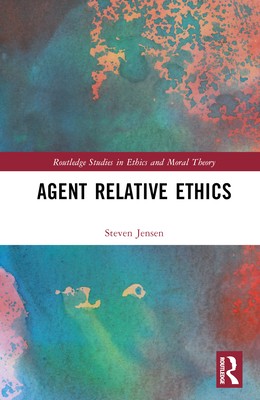
- We will send in 10–14 business days.
- Author: Steven Jensen
- Publisher: Routledge
- ISBN-10: 1032502711
- ISBN-13: 9781032502717
- Format: 15.2 x 22.9 x 1.6 cm, hardcover
- Language: English
- SAVE -10% with code: EXTRA
Reviews
Description
Agent Relative Ethics asks what the world would look like if we adopted agent relativity wholeheartedly, clinging to no shred of absolute morality.
Alastair MacIntyre's haunting image of a post-apocalyptic world, in which our knowledge of ethics has been fragmented, poses a contrast between modern morality and ancient ethics. The two stand divided along the fault line of the nature of the good. Modern ethics has placed its stake in the absolute good, while ancient ethics rests upon the foundation of the relative good. Following the lead of Bernard Williams, Agent Relative Ethics identifies alienation as a disturbing symptom of the present focus upon absolute goods. It then completes the diagnosis of the malady afflicting modern moral theory by clarifying the difference between absolute and relative goods. The remainder of the book explores how agent relativity can overcome the modern fragmentation of our ethical knowledge. Not just any relative goods can rectify the modern disorder. Only shared goods, belonging to a union of individuals, are sufficiently robust to overthrow the contemporary despotism of neutral goods. These shared goods exhibit many parallels with common sense morality, including partiality, impartiality, punishment, and an antagonism toward harmfully using others together with a more lenient attitude toward foreseeing harm. The final chapters probe the conditions, often unpalatable to the modern mind, by which ethics might be restored.
Agent Relative Ethics will be of interest to scholars and advanced students working in ethics and moral theory, ancient ethics, and the history of philosophy.
EXTRA 10 % discount with code: EXTRA
The promotion ends in 19d.15:34:19
The discount code is valid when purchasing from 10 €. Discounts do not stack.
- Author: Steven Jensen
- Publisher: Routledge
- ISBN-10: 1032502711
- ISBN-13: 9781032502717
- Format: 15.2 x 22.9 x 1.6 cm, hardcover
- Language: English English
Agent Relative Ethics asks what the world would look like if we adopted agent relativity wholeheartedly, clinging to no shred of absolute morality.
Alastair MacIntyre's haunting image of a post-apocalyptic world, in which our knowledge of ethics has been fragmented, poses a contrast between modern morality and ancient ethics. The two stand divided along the fault line of the nature of the good. Modern ethics has placed its stake in the absolute good, while ancient ethics rests upon the foundation of the relative good. Following the lead of Bernard Williams, Agent Relative Ethics identifies alienation as a disturbing symptom of the present focus upon absolute goods. It then completes the diagnosis of the malady afflicting modern moral theory by clarifying the difference between absolute and relative goods. The remainder of the book explores how agent relativity can overcome the modern fragmentation of our ethical knowledge. Not just any relative goods can rectify the modern disorder. Only shared goods, belonging to a union of individuals, are sufficiently robust to overthrow the contemporary despotism of neutral goods. These shared goods exhibit many parallels with common sense morality, including partiality, impartiality, punishment, and an antagonism toward harmfully using others together with a more lenient attitude toward foreseeing harm. The final chapters probe the conditions, often unpalatable to the modern mind, by which ethics might be restored.
Agent Relative Ethics will be of interest to scholars and advanced students working in ethics and moral theory, ancient ethics, and the history of philosophy.


Reviews